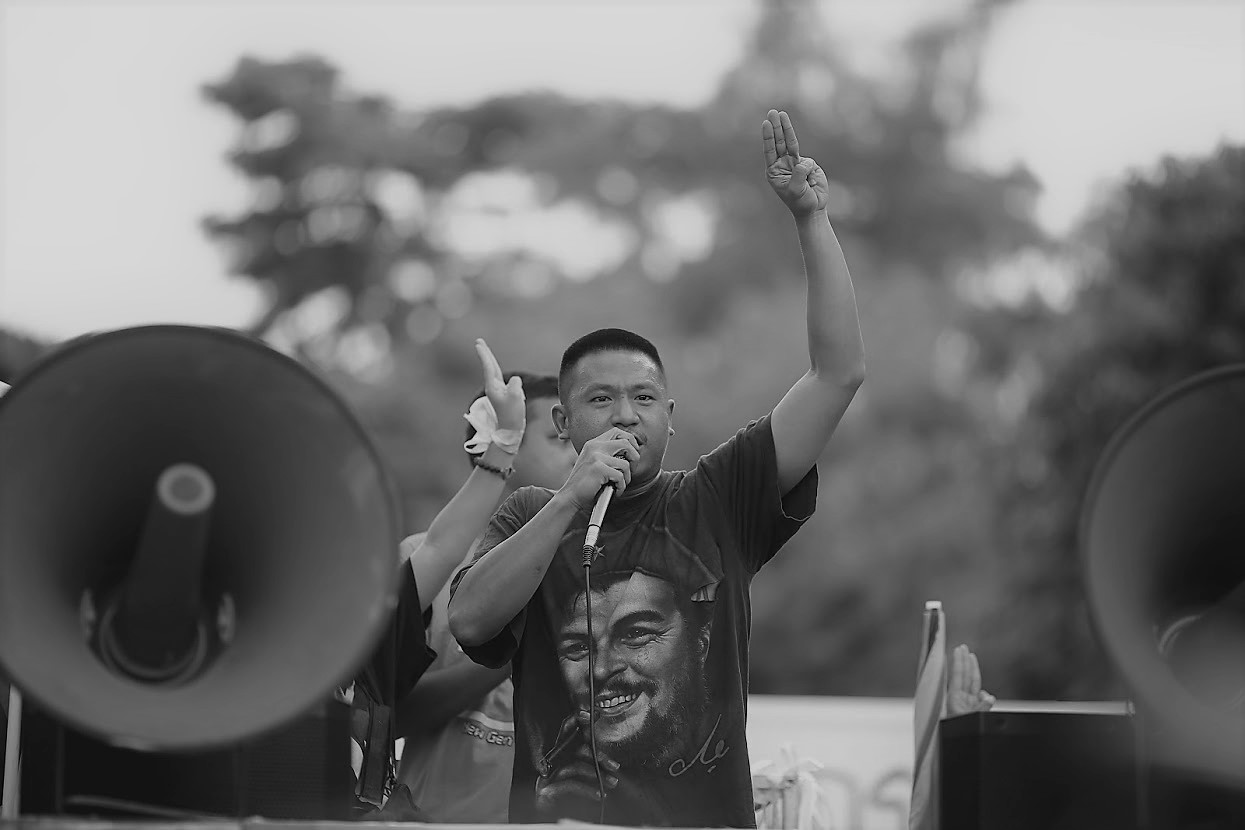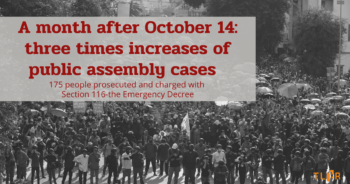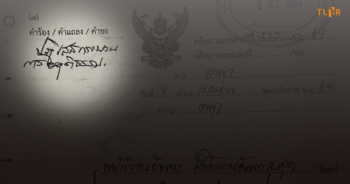Jatupat “Pai” Boonpattararaksa was arrested on 13 October 2020, one day before the massive demonstration. There was no sign then that the government would pursue harsh measures against the protesters. The forcible dispersal of the gathering at the Democracy Monument was as violent as other times. Pai and his 20 friends were arrested before anyone else.
One of the 21 is a minor and three are women. But since yesterday, the 20 friends arrested along with him had their bail granted leaving Pai to live by himself in the prison.
Pai says he can survive here. He was on his own in prison for two years. But we could observe an uneasy feeling across his face. When we asked about his feeling having to return to prison again, it was even more saddening.
“I feel indifferent. It is a bad feeling. I feel indifferent to violence. They were so harsh against me that all my feelings are shut down. It is not good. It makes me feel bad. Such violence has been abetted with the help of the law. Such violence has been made possible by the judicial process. The law is being weaponized to suppress dissent. The police cook up the charges and the Court just reciprocates. This is all absurd. This should never have happened. But I have been subjected to it numerous times until I now feel numb. It is an abnormality being accepted as a new normal in Thailand.”
His clear determination is visible when he is asked why he cannot stop his fight.
“I believe that what I have done is not wrong. It can never be wrong. No matter how many times I am subjected to this, it will never make me feel that I have done anything wrong. It is always right. Our demands are always correct. We want to topple the dictators and we have come up with three demands: the resignation of Prayuth, a new Constitution, and reform to place the monarchy under the Constitution. These are all doable, I believe.
“When I made my demands, when I organized activities, I never thought that it would land me in jail. I just pitched the idea, explained my demands, and we just did it. I tried to invent creative methods to make my demands, staying patient and being creative. But look at what the state has done to us, the violence inflicted on us. They just demolished our tents, they deprive us of our human dignity. They beat my friends and pulled them forcefully as if we are not human beings. Now, they even accuse us of causing physical injuries to the police. They just trumped up the charges against us. Yesterday, they came to press more charges against me.”
“That day (13 October), I cried, not for myself. But while speaking on the platform, I could see everything. I saw how they beat people up, how they dragged my friends away even though we were nonviolent.”
“We always adhere to nonviolence. But they took it away from us by committing violence against us. We tried to reason with them, but they use power. We try to fight for justice, but they weaponize the judicial process against us.”
When asked about his future actions, he says, with no hesitation:
“If people outside still fight, I will fight. We cannot live like this, we cannot live in a society like this. It is no different from before. It is clear that no one takes our side. No good police come out to stop their fellow police from beating us. No judge says they should not treat us like this since the entire judicial system is dysfunctional. None of them. The police and the court have already chosen sides. They never side with the people. That’s why we have to come out to make our demands since it is the only hope we have.”
“We cannot place any hope in the Court or in the police. We need to rely on each other to fight for social justice. We need to demand the principles that uphold the right to bail and the right to freedom of expression. We need to oust this government since it tends to use violence. We need to rewrite the Constitution to ensure social justice. We need reform of the monarchy to put it under the law since the violence this time has been abetted by referring to the incident involving the royal motorcade, and the judgment is going to be made under the seal of His Majesty.”
After chatting for a bit, we pivoted to his legal case. Pai wants to challenge the remand order, but he is reluctant to participate in a remand hearing via videoconferencing (a video feed from the courtroom will be streamed to the prison and the alleged offender does not need to be at the court so that the judge may inquire whether or not he objects to the remand order). He finds videoconferencing too simplistic. It can only be used when the alleged offender does not oppose the remand order.
Pai wants to be physically present at the hearing to encounter the police, the judges, the attorneys and to participate in the remand hearing himself. The remand hearing is supposed to take place every 12 days given the Covid-19 precaution. And once out of the prison, upon return, he will have to be quarantined again for another 14 days. That means if Pai really wants to be brought to the court for the remand hearing, after that he would be barred from having access to anyone else, except his attorneys and his fellow inmates. He would not have a chance to meet his relatives and friends. Therefore, Pai opted to not participate in the remand hearing either via videoconference or being physically brought to the court.
Alter all, the only hope for Pai to stay outside the prison is to exercise his right to bail by appealing to the Court whose judgments are made under the seal of His Majesty the King.
On 23 October 2020, Pai was allowed by the Appeals Court to post bail by placing a surety worth 70,000 baht for each case, for a total of 140,000 baht. An MP agreed to use his position to vouch for him and set him free. The correction officers came to the Court with a release warrant in the late afternoon to set him free. He spent a total of 11 days and 10 nights behind bars.
Photo courtesy to กันต์ แสงทอง (Kan Sangtong)
Read related stories:
Voice of “Rung Panusaya” from the Central Women’s Prison (22 Oct 2020)




